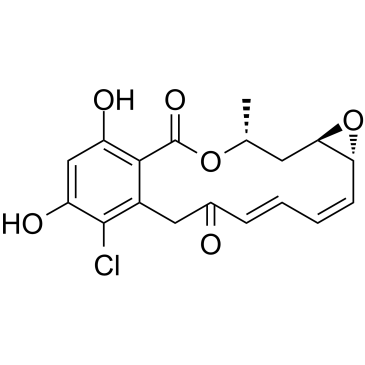18β-glycyrrhetinic acid potentiates Hsp90 inhibition-induced apoptosis in human epithelial ovarian carcinoma cells via activation of death receptor and mitochondrial pathway.
Jae Chon Yang, Soon Chul Myung, Wonyong Kim, Chung Soo Lee
文献索引:Mol. Cell Biochem. 370(1-2) , 209-19, (2012)
全文:HTML全文
摘要
The Hsp90 inhibition has been shown to induce apoptosis in various cancer cells. The licorice compounds may enhance the anti-cancer drug effect. However, effect of the licorice compounds on the Hsp90 inhibition-induced apoptosis in ovarian cancer cells has not been studied. To assess the ability of 18β-glycyrrhetinic acid to promote apoptosis, we examined whether 18β-glycyrrhetinic acid potentiated the Hsp90 inhibitor-induced apoptosis in the human epithelial ovarian carcinoma cell lines OVCAR-3 and SK-OV-3. Radicicol and geldanamycin induced a decrease in Bid, Bcl-2, Bcl-xL and survivin protein levels, an increase in Bax levels, the mitochondrial transmembrane potential loss, cytochrome c release, activation of caspases (-8, -9, and -3), cleavage of PARP-1, and an increase in the tumor suppressor p53 levels. 18β-Glycyrrhetinic acid enhanced Hsp90 inhibitor-induced apoptosis-related protein activation, nuclear damage, and cell death. The results suggest that 18β-glycyrrhetinic acid may potentiate the Hsp90 inhibition-induced apoptosis in ovarian carcinoma cell lines via the activation of the caspase-8- and Bid-dependent pathways and the mitochondria-mediated cell death pathway, leading to activation of caspases. Combination of Hsp90 inhibitors and 18β-glycyrrhetinic acid may confer a benefit in the treatment of epithelial ovarian adenocarcinoma.
相关化合物
| 结构式 | 名称/CAS号 | 分子式 | 全部文献 |
|---|---|---|---|
 |
根赤壳菌素
CAS:12772-57-5 |
C18H17ClO6 |
|
Screening for negative effects of candidate ascidian antifou...
2013-01-01 [Biofouling 29(1) , 29-37, (2013)] |
|
[Thermosensitization of tumor cells with inhibitors of chape...
2012-01-01 [Biomed. Khim. 58(6) , 662-72, (2012)] |
|
Geldanamycin and its derivatives as Hsp90 inhibitors.
2012-01-01 [Front. Biosci. (Landmark Ed.) 17 , 2269-77, (2012)] |
|
Loss of tumor suppressor NF1 activates HSF1 to promote carci...
2012-10-01 [J. Clin. Invest. 122(10) , 3742-54, (2012)] |
|
Radicicol, an inhibitor of Hsp90, enhances TRAIL-induced apo...
2012-01-01 [Mol. Cell Biochem. 359(1-2) , 33-43, (2012)] |